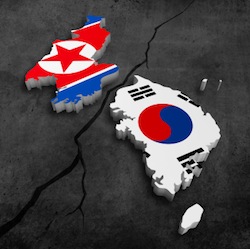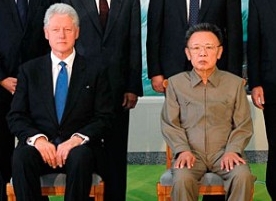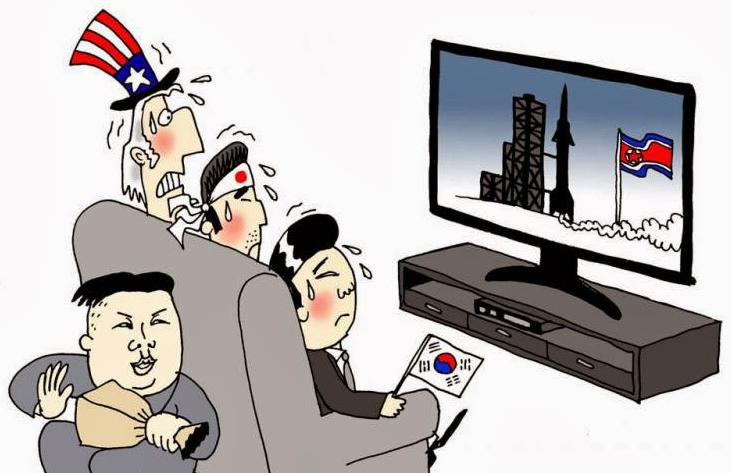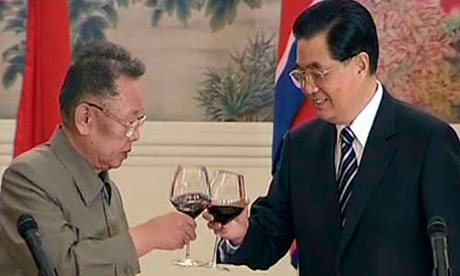It looks like you're using an Ad Blocker.
Please white-list or disable AboveTopSecret.com in your ad-blocking tool.
Thank you.
Some features of ATS will be disabled while you continue to use an ad-blocker.
share:
As goofy as this interview was, Obama answers them in a playful, yet serious manner and might have dropped a few hints along the way. Most of his comments are baseless so please, don't take the video too seriously.
Something struck me about his response to the North Korean sanctions. That "ratcheting" motion was Obama's way of turning up the heat. Scripted or not, it doesn't stop me from trying to make sense of it all.
I found an interesting paper released on January 13, 1999, published by the Council on Foreign Relations that puts forth an interesting scenario.
The author attempts to answer two separate questions. Can we and should we cause the collapse of North Korea. It certainly had me thinking.
Author: Frank Sampson Jannuzi
Source
Can the United States Cause the Collapse of North Korea? Should We Try?
Defining "Collapse"
In attempting to answer these two questions, one must first briefly define collapse. As used by observers of the Democratic People's Republic of Korea (DPRK), the term collapse describes a rapid, traumatic process culminating in the dissolution of the North Korean state. A toppling of the Kim Jong Il regime would not itself constitute a collapse of North Korea, even though it might set in motion the eventual disintegration of the state. Collapse could occur relatively peacefully, or as a result of civil or military insurrection. Collapse might even include a brief, albeit costly, military clash with South Korea.
For the purposes of this paper, I am ruling out consideration of any collapse scenario that is the result of a deliberate war of national reunification, whether initiated by the North or the South. There is little doubt that the United States and South Korea together possess the military capability to bring about the collapse of North Korea through force of arms, but few if any American or South Korean officials would advocate such an approach--with its enormous costs--so long as there are viable alternatives.
For a country that most don't take seriously, there is a real threat that exists. North Korea is equivalent to a hornets nest. They serve the queen while enough workers bees are produced and die off as needed, working inside a self serving colony. Can the rest of the world "evolve" around North Korea or will there come a time when foreign policy dictates that we draw them into war?

I assume that the long-term goal of the United States is to affect--at minimum cost--the reunification of the Korean peninsula under a liberal democratic government, friendly to the United States and fully integrated into the region's political, economic, and security regimes. If the United States were ever to embrace the concept of a divided peninsula as a desirable end-state, this would obviously have a decisive impact on the answer to the second question above.
Can the US "cause" the collapse in their favor is what I'm hearing. The cover of this book tells the tale of peace, freedom and a liberal democracy, until you open the cover and the pages are stained with blood.
Policy Options
If one rules out a military attack, the United States can use three basic strategies in pursuing the collapse of the North Korean state.
⦁ Containment--relying on deterrence for the present, while hoping for the eventual collapse of North Korea as a consequence of its economic and political isolation and the high costs of waging a "cold war" against the United States and South Korea
⦁ Active Destabilization--an aggressive policy combining military pressure, economic strangulation, and political destabilization, all designed to topple the regime of Kim Jong Il and bring about the collapse of the North Korean state as soon as possible
⦁ Engagement--with the near-term goal of reducing tension on the peninsula, luring the North out of its isolation, and encouraging the DPRK "to become a responsible member of the international community."
These strategies are not necessarily mutually exclusive but rather reflect different blends of carrots and sticks applied in pursuit of different near-term objectives. For example, a policy of containment would not preclude efforts to put in place confidence-building measures to minimize the risk of war. It probably would, however, rule out lifting sanctions or taking other steps that might contribute to the economic and military well-being of North Korea.

I love how they write these pieces as fiction, but you and I know the deal. The mindset is, if they openly lay out their plans, exposing them to all, those that can make sense of it will have the chance to counteract or revolt. The more of us who are sleeping, the sooner the whole thing rolls over. Not really a fair game.
The administration has at times been vague, perhaps deliberately, about its endgame. The long-term objective of reunification is clearly subordinate to the near-term objective of promoting stability. Eventually, engagement could itself result in the "collapse" of North Korea, but this is usually described as a possible "side-effect" of the strategy, not its objective. In fact, the policy was devised, in part, to ward off a potentially dangerous North Korean collapse. The preferable path to reunification under the engagement strategy is one of managed incremental political accommodation--perhaps culminating with confederation, "one country, two systems," or even a U.N.-brokered peace agreement and plebiscite.

Well, that's one way to get them to join the UN Security Council. It certainly is "game over" in the grand scheme of things for the North and South Koreans even though they will likely see this as a blessing.
The article goes on to describe the "hard landing" approach to be used if all else fails at reforming the peninsula with as little bloodshed as possible.
edit on 15-3-2015 by eisegesis because: (no reason given)
Should We Try?
Logistics and dynamics are extremely important when dealing with North Korea considering their unique military structure. North Koreas has built quite the arsenal behind those wall and isn't afraid to show off his if you show yours first.

I don't have much knowledge about playing war games and even though I've joked around in the past, it doesn't mean the US should take the situation lightly. The sleeping dragon will awaken and the US would be seeing red before dawn.

It's been a while since this was published and I'd like to know what you think. Can we be witnessing this play out before our very eyes? So slow perhaps that even though externally North Korea appears unchanged, what's happening on the inside as been a result of US foreign policy dictatorship at play. Any thoughts?
Quote of the Day...
Interviewer: "Before I came here to do this interview for YouTube, I never really followed politics that much."
Obama: "You're not the only one."
The answer to the second question depends on three factors: the chance of "success," the risks involved, and the availability of preferable alternatives. As discussed above, a policy of destabilization stands little chance of toppling the Kim Jong Il regime or bringing about the collapse of the North Korean state. Such a policy would isolate the United States diplomatically and play to the strengths of the dictatorial North Korean regime
Logistics and dynamics are extremely important when dealing with North Korea considering their unique military structure. North Koreas has built quite the arsenal behind those wall and isn't afraid to show off his if you show yours first.

Despite its obsolete military hardware, the North could still inflict considerable damage on U.S. and South Korean forces with little advance warning. Long-range self-propelled artillery located in hardened tunnel complexes along the demilitarized zone (DMZ) could fire thousands of high-explosive or chemical-biological rounds on Seoul in the initial hours of any conflict. SCUD missiles, also possibly equipped with unconventional warheads, could range the entire Korean peninsula. As the United States discovered during the Gulf War, destroying mobile SCUD launchers is difficult, even in the desert. It would prove a daunting task in the mountains of North Korea.
I don't have much knowledge about playing war games and even though I've joked around in the past, it doesn't mean the US should take the situation lightly. The sleeping dragon will awaken and the US would be seeing red before dawn.

It's been a while since this was published and I'd like to know what you think. Can we be witnessing this play out before our very eyes? So slow perhaps that even though externally North Korea appears unchanged, what's happening on the inside as been a result of US foreign policy dictatorship at play. Any thoughts?
Quote of the Day...
Interviewer: "Before I came here to do this interview for YouTube, I never really followed politics that much."
Obama: "You're not the only one."
originally posted by: Taupin Desciple
a reply to: eisegesis
We should be more concerned about our own collapse. Screw NK.
That was about the best answer you could give in the shortest amount of words possible.
From "our" standpoint, that would be the consensus.
What a load of sanctimonious bo****ks! Your all screaming about what Putin is supposedly doing in the Ukraine yet this is exactly the same.
STOP, STOP, STOP interfering in other countries policies. Leave them alone.
If NK were to physically attack the US then yes act but until then it is only verbal rhetoric.
It's about time the USA evolved and grew up in trying to change any part of the world in their image.
STOP, STOP, STOP interfering in other countries policies. Leave them alone.
If NK were to physically attack the US then yes act but until then it is only verbal rhetoric.
It's about time the USA evolved and grew up in trying to change any part of the world in their image.
originally posted by: crayzeed
What a load of sanctimonious bo****ks! Your all screaming about what Putin is supposedly doing in the Ukraine yet this is exactly the same.
STOP, STOP, STOP interfering in other countries policies. Leave them alone.
If NK were to physically attack the US then yes act but until then it is only verbal rhetoric.
It's about time the USA evolved and grew up in trying to change any part of the world in their image.
What he said in 200ft gold letters.
a reply to: crayzeed
Unless the CFR folds it's cards and calls it quits, that's not going to happen. Even if the US had a "regime" change of it's own, most governments and their foreign policy are dictated by a higher power. The article was written in the sense of "when and how" not "if and maybe".
STOP, STOP, STOP interfering in other countries policies. Leave them alone.
Unless the CFR folds it's cards and calls it quits, that's not going to happen. Even if the US had a "regime" change of it's own, most governments and their foreign policy are dictated by a higher power. The article was written in the sense of "when and how" not "if and maybe".
edit on 15-3-2015 by eisegesis because: (no reason given)
What ever 'collapse' means. Who US of A elite going to bitch about when that happens?
2nd.
DO
2nd.
DO
Collapse? There's nothing to collapse.
North Korea long ago imploded. The people are insanely brain washed. Starvation has been apocalyptic for as long as I can remember.
What exactly would we help to collapse? The government? How exactly do you do that without going to war?
North Korea long ago imploded. The people are insanely brain washed. Starvation has been apocalyptic for as long as I can remember.
What exactly would we help to collapse? The government? How exactly do you do that without going to war?
I wouldn't worry about N. Korea. We already gave them 511 problems a while ago. They are no threat anymore. Surprised they still like to talk all
that smack though. Short memories they have. Maybe time for another reminder.
a reply to: darkorange
It was clearly defined in the article. Read more, then maybe expand your post. They are saying that neither the North or South could incite a war to reunite themselves, therefore it becomes our duty. Which is crap.
What ever 'collapse' means.
It was clearly defined in the article. Read more, then maybe expand your post. They are saying that neither the North or South could incite a war to reunite themselves, therefore it becomes our duty. Which is crap.
In attempting to answer these two questions, one must first briefly define collapse. As used by observers of the Democratic People's Republic of Korea (DPRK), the term collapse describes a rapid, traumatic process culminating in the dissolution of the North Korean state. A toppling of the Kim Jong Il regime would not itself constitute a collapse of North Korea, even though it might set in motion the eventual disintegration of the state. Collapse could occur relatively peacefully, or as a result of civil or military insurrection. Collapse might even include a brief, albeit costly, military clash with South Korea.
For the purposes of this paper, I am ruling out consideration of any collapse scenario that is the result of a deliberate war of national reunification, whether initiated by the North or the South. There is little doubt that the United States and South Korea together possess the military capability to bring about the collapse of North Korea through force of arms, but few if any American or South Korean officials would advocate such an approach--with its enormous costs--so long as there are viable alternatives
originally posted by: projectvxn
Collapse? There's nothing to collapse.
North Korea long ago imploded. The people are insanely brain washed. Starvation has been apocalyptic for as long as I can remember.
What exactly would we help to collapse? The government? How exactly do you do that without going to war?
The point was how do we do it without causing a nuclear war. Articles like this weren't written as bedtime stories for children.
Crisis Guide: The Korean Peninsula
The US tends to prefers the devil it knows. It only tends to react once a change appears to be on the way to try and get to fall their way. The US
would prefer not see another Syria in particular with the heavy amount of arms floating around in the North. Although it would never say it publicly
the US would prefer North Korea as it because the mess that it could become could be a disaster.
a reply to: MrSpad
You never know, if the US decide to arm the people of North Korea, they just might turn around and take back their own country!
The middle east is just dynamically more efficient considering their ties with the devil in that region. They are directly affecting US policy with foreign policy and it makes me scream.
Once that project is over, they're going to have to pay back China BIGTIME in order to get "permission" to dissolve the line dividing the Korean peninsula.
As long as we promise to keep buying crap from China, the new Korean Democracy will flourish!
You never know, if the US decide to arm the people of North Korea, they just might turn around and take back their own country!
The middle east is just dynamically more efficient considering their ties with the devil in that region. They are directly affecting US policy with foreign policy and it makes me scream.
Once that project is over, they're going to have to pay back China BIGTIME in order to get "permission" to dissolve the line dividing the Korean peninsula.
As long as we promise to keep buying crap from China, the new Korean Democracy will flourish!
edit on 15-3-2015 by eisegesis because: (no reason given)
a reply to: eisegesis
We should allow North Korea to do whatever they want.
We should allow China to take back Taiwan and anything else they want.
We should allow Russia to annex the Ukraine and whoever else they want.
We should allow Iran to develop nukes.
We should allow ISIS to run rampant.
We should allow Boko Harum to continue his growth in Africa.
Just so the world will be a better place without American intervention.
We should allow North Korea to do whatever they want.
We should allow China to take back Taiwan and anything else they want.
We should allow Russia to annex the Ukraine and whoever else they want.
We should allow Iran to develop nukes.
We should allow ISIS to run rampant.
We should allow Boko Harum to continue his growth in Africa.
Just so the world will be a better place without American intervention.
a reply to: eisegesis
Every time the U.S. gets involved in overthrowing a leader or puts pressure on a country to change it's political ideology, it comes back to bite us in the butt. The U.S. continues to follow a foreign policy of policing and secretly destabilizing countries that are considered a threat to U.S. interests. Change has to come from within and from the people to have an everlasting change to a country's ideology.
I have to echo previous posters who stated we better worry more about our own collapse. Were losing industrial high paying jobs overseas. Our economy is headed for a crisis. Education is no longer a priority and dumbing down the curriculum is occurring across the country. Our system of government is failing to protect the constitutional rights of its citizens. Corporations, the banking system and the elite are controlling government policy. Representatives no longer represent the people but themselves and corporate interests. Our health care costs and college tuition is skyrocketing preventing many citizens from getting proper medical attention and pursuing a college education. Government has gotten way too involved in our private lives and they're over taxing us, giving us less expendable income to raise a family and pay our bills.
Every time the U.S. gets involved in overthrowing a leader or puts pressure on a country to change it's political ideology, it comes back to bite us in the butt. The U.S. continues to follow a foreign policy of policing and secretly destabilizing countries that are considered a threat to U.S. interests. Change has to come from within and from the people to have an everlasting change to a country's ideology.
I have to echo previous posters who stated we better worry more about our own collapse. Were losing industrial high paying jobs overseas. Our economy is headed for a crisis. Education is no longer a priority and dumbing down the curriculum is occurring across the country. Our system of government is failing to protect the constitutional rights of its citizens. Corporations, the banking system and the elite are controlling government policy. Representatives no longer represent the people but themselves and corporate interests. Our health care costs and college tuition is skyrocketing preventing many citizens from getting proper medical attention and pursuing a college education. Government has gotten way too involved in our private lives and they're over taxing us, giving us less expendable income to raise a family and pay our bills.
edit on 15-3-2015 by WeRpeons because: (no reason given)
a reply to: beezzer
Is it really American intervention? I mean, you've been on here long enough to know that Obama isn't the one calling the shots, nor are his advisers when it comes to foreign policy. The UN, EU, CFR, TC handle that.
What you're saying is, if the US stays out of everybody's business, the world becomes a better place? I would agree if that was the case, but the real movers and shakers would just find someone else to do their bidding. The US has already sold it's soul and the only way to live free is to jump ship.
The US aren't doing any of this for their own safety or interest as it would seem on the surface, even though the dog does receive a nice juicy steak once in a while. The US is a tool wielded by the real deciders of foreign policy. If we stop, nothing stops, it just becomes harder and takes longer.
Just so the world will be a better place without American intervention.
Is it really American intervention? I mean, you've been on here long enough to know that Obama isn't the one calling the shots, nor are his advisers when it comes to foreign policy. The UN, EU, CFR, TC handle that.
What you're saying is, if the US stays out of everybody's business, the world becomes a better place? I would agree if that was the case, but the real movers and shakers would just find someone else to do their bidding. The US has already sold it's soul and the only way to live free is to jump ship.
The US aren't doing any of this for their own safety or interest as it would seem on the surface, even though the dog does receive a nice juicy steak once in a while. The US is a tool wielded by the real deciders of foreign policy. If we stop, nothing stops, it just becomes harder and takes longer.
a reply to: beezzer
Have you noticed all the problems of the world you stated are not in our backyard? Maybe it's about time more countries start taking care of their own neighborhoods! Nothing like relying on a country half way around the world to solve problems in their own neighborhood. If the U.S. continues to act like the world's policeman, and continues to be the henchman for other countries around the world, our citizens are the ones who end up paying with their lives in the long run. Our politicians have no problem committing our young men and women to sacrifice their lives at the stroke of a pen for conflicts that don't have a direct threat against the U.S. mainland.
The U.S. has created a majority of their enemies because of their direct and covert involvement in foreign matters.
We should allow North Korea to do whatever they want.
We should allow China to take back Taiwan and anything else they want.
We should allow Russia to annex the Ukraine and whoever else they want.
We should allow Iran to develop nukes.
We should allow ISIS to run rampant.
We should allow Boko Harum to continue his growth in Africa.
Just so the world will be a better place without American intervention.
Have you noticed all the problems of the world you stated are not in our backyard? Maybe it's about time more countries start taking care of their own neighborhoods! Nothing like relying on a country half way around the world to solve problems in their own neighborhood. If the U.S. continues to act like the world's policeman, and continues to be the henchman for other countries around the world, our citizens are the ones who end up paying with their lives in the long run. Our politicians have no problem committing our young men and women to sacrifice their lives at the stroke of a pen for conflicts that don't have a direct threat against the U.S. mainland.
The U.S. has created a majority of their enemies because of their direct and covert involvement in foreign matters.
a reply to: WeRpeons
I would say that our leader is well aware and scripted going into any situation that does not have the support of the people. The backlash has now become controllable with divide and conquer tactics amongst our peers. Can't remember when the last time our government had our support.
The chessboard is too large for the average person to comprehend and sadly, the more bombs we drop overseas the more of a ripple effect it causes back home. Our middle east cousins have no idea that most Americans despise are own governments actions. The propaganda works both ways.
The goal has been destruction of the middle class for a long time. It just had to be redefined in order not to miss it when it goes. I'd say they've been success full at forcing us to keep our wallets open while they conjure up al sorts of trouble overseas. The US and it's people exist only to serve as funding for foreign imperialistic world domination run by plutocrats.
Every time the U.S. gets involved in overthrowing a leader or puts pressure on a country to change it's political ideology, it comes back to bite us in the butt.
I would say that our leader is well aware and scripted going into any situation that does not have the support of the people. The backlash has now become controllable with divide and conquer tactics amongst our peers. Can't remember when the last time our government had our support.
The chessboard is too large for the average person to comprehend and sadly, the more bombs we drop overseas the more of a ripple effect it causes back home. Our middle east cousins have no idea that most Americans despise are own governments actions. The propaganda works both ways.
The goal has been destruction of the middle class for a long time. It just had to be redefined in order not to miss it when it goes. I'd say they've been success full at forcing us to keep our wallets open while they conjure up al sorts of trouble overseas. The US and it's people exist only to serve as funding for foreign imperialistic world domination run by plutocrats.
a reply to: WeRpeons
I'm not a big fan of isolationism simply because that, too, will come back and bite us in the butt.
This might have been effective half a century ago, but in today's global economy, unfortunately, we're all connected. So what affects a small market on the other end of the earth, does impact us here at home.
Do we meddle too much?
Yes.
Do we spend too much in foreign aid?
Yes.
The solutions, however, might be more drastic than the problems.
I'm not a big fan of isolationism simply because that, too, will come back and bite us in the butt.
This might have been effective half a century ago, but in today's global economy, unfortunately, we're all connected. So what affects a small market on the other end of the earth, does impact us here at home.
Do we meddle too much?
Yes.
Do we spend too much in foreign aid?
Yes.
The solutions, however, might be more drastic than the problems.
new topics
-
Merry Christmas !!
General Chit Chat: 1 hours ago
top topics
-
University looking for gender diverse kids to play with transgender dolls for research
Social Issues and Civil Unrest: 17 hours ago, 9 flags -
This is an interesting picture. Do we actually pick our leaders?
Politicians & People: 12 hours ago, 9 flags -
Trump says ownership of Greenland 'is an absolute necessity'
Other Current Events: 16 hours ago, 8 flags -
U.S. Govt Agencies That Protect Criminals in Government - National Archives Records Admin-NARA.
Political Conspiracies: 14 hours ago, 6 flags -
FAA Investigates Christmas Drone Show Gone Wrong in Orlando, FL 12/2024
Other Current Events: 17 hours ago, 5 flags -
An Updated China Navy Analysis and the Challenges of their AI/Drone Development
Military Projects: 17 hours ago, 4 flags -
Merry Christmas !!
General Chit Chat: 1 hours ago, 2 flags
active topics
-
Merry Christmas !!
General Chit Chat • 2 • : TNMockingbird -
The Shed 26
General Chit Chat • 841 • : TNMockingbird -
Biden Nationalizes Another 50,000+ Student Loans as He Heads for the Exit
US Political Madness • 22 • : 38181 -
This is an interesting picture. Do we actually pick our leaders?
Politicians & People • 8 • : UpIsNowDown2 -
Spiritual Solstice
Short Stories • 16 • : Naftalin -
California Business Owners Blindsided by Surprise Payroll Taxes
US Political Madness • 15 • : Dalamax -
-@TH3WH17ERABB17- -Q- ---TIME TO SHOW THE WORLD--- -Part- --44--
Dissecting Disinformation • 3794 • : brewtiger123 -
U.S. Govt Agencies That Protect Criminals in Government - National Archives Records Admin-NARA.
Political Conspiracies • 6 • : confuzedcitizen -
Can we be certain that Jesus Christ was born on December 25th?
Religion, Faith, And Theology • 31 • : confuzedcitizen -
Australian mercenary caught and crying as he is a prisoner of war.
Other Current Events • 42 • : confuzedcitizen
